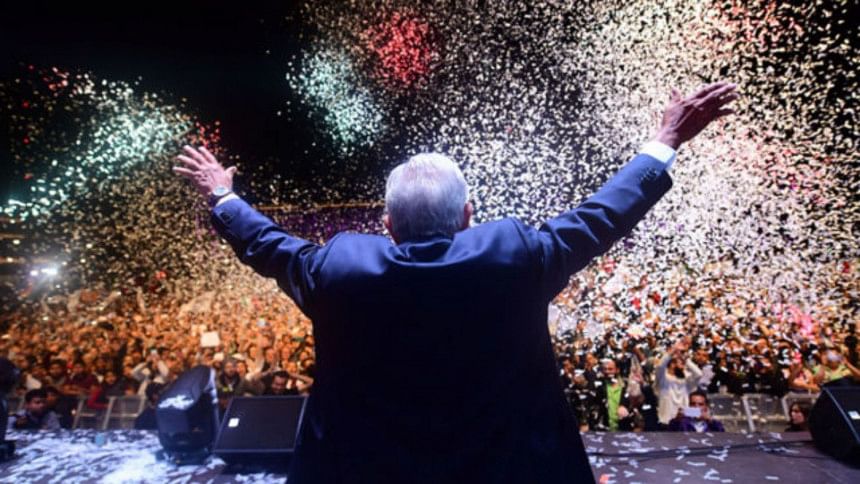Mexican polls: The other soul

Democracy is, by far, the most acclaimed historical form of government. It not only allows representation of all groups, but also permits every adult to exercise complete sovereignty at the polling booth. There might be nuances and variances here or there, particularly in the preceding campaigns and subsequent outcomes, but we have, by and large, managed to live with our differences, converse with adversaries, and bite the bullet so democracy strengthens itself.
Twenty-first century elections have been breaking that model. We now see democratic elections so dividing countries that consensus, or any form of civil conversation, has been thrown out the window. Too much media attention to Donald J Trump's presidential victory constrains me from using his election to illustrate, but talking about Turkey's election last month, Nathan Gardels, editor of The Washington Post, made a relevant observation (June 29, 2018): "majoritarian democracy is not a friend of liberal values." Recep Tayyip Erdogan's Islamist Justice and Development Party (AKP) meant, to him, "the return of the repressed from Turkey's military-enforced secular past," with "[t]he other half of society. . .essentially [being] disenfranchised even though they voted."
Mexico may be precisely in such a plight after its July 1 election. Andrés Manuel López Obrador (AMLO), the leftist leader of the newly-formed Morena Party, might justifiably call it third-time lucky. Once a popular, progressive mayor of one of the world's largest cities (2000-05), AMLO's two previous defeats were highlighted by him holding that city hostage to his loss: camping with his die-hard fans right smack in the middle of Mexico City, which is notorious for its traffic bottlenecks, he vigorously complained of being "robbed" of the 2006 election victory in a country famous for its shady and under-the-table deals, and even formed a "shadow government" on the streets. One would have thought his civil disobedience 12 years ago would have undone his political future today, as in 2012. Clearly, his opponents believed so.
Not so, and not by a long shot. Rallying behind him, Mexicans destroyed in one fell swoop the major vestiges of institutionalised political power: both dominant political parties were blown into smithereens in a country where they were fraying for almost all of this century; and with them, the bastions of local power, the governors of 32 "states" (provinces), who had previously served as king-makers, were also blown asunder in domino effect. His Morena Party (Movimiento Regeneración National, or National Regeneration Movement; he had previously run as a candidate for the leftist Partido Revolucionary Democratica, PRD) irreparably damaged extant political strangleholds. In power for seven straight decades until 2000, the dominant PRI (Partido Revolucionario Institucional) Party had established themselves, counting on "governors" to deliver in polls. Peruvian Nobel Laureate poet Mario Llosa Vargas even called the party "the perfect dictatorship".
There then followed a comedy of errors. As Mexico became one of the most vibrant democracies in this century, both PAN and PRI simply failed to deliver what they campaigned for. Narcotics-trade, corruption, and spiralling insecurity cannot be blamed exclusively upon them, endemic as they are, but that these ran out of control under their administration demands they be held as culpable as any other.
At least the public felt so this time, aided by another secular development. Mexico's neoliberal embrace from 1983 (the Baker Plan of debt-relief), which culminated in the 1993 eye-raising North American Free Trade Agreement (NAFTA, the first regional arrangement in which a less-developed country partnered a developed counterpart), resulted in an income-disparity gap, particularly in the countryside, that could no longer be whitewashed. Fuming for years, furiously at that, voters rallied behind this populist, opportunist, and law-breaking (as his 2006 Mexico City tantrums exposed) politician who won his stripes as a PRI member before drifting increasingly left with every adversity. Clearly, his will not be the "left" as is defined and described in political literatures and dictionaries, but neither can the public support that made him Mexico's first "left" president be ignored or dismissed.
AMLO's campaign slogans summarise what was at stake. His calls for "good people" to "throw the bums out" and reference to a "mafia of power" show how seriously Mexicans were taking corruption and inequalities. In return, the 53 percent of votes he tallied (ironically, the same proportion as Erdogan received), was more than what Ricardo Anaya, the joint PRD-PAN (Partido de Acción Nacional) candidate, and PRI's José Antonio Meade, got collectively (22 percent and 16 percent). Not only that, Morena swept the congressional elections (500 deputies). It was a dramatic rebuke of the country's elites in one of the most violent elections held in living memory (130+ party candidates or workers being killed), amid the most insecure moment in recent Mexican history (25,000+ violent homicides in 2017 alone).
Mexico needs a tough leader to face these domestic crises, which the last three presidents failed to be: Vicente Fox Quesada (PAN, 2000-06), Felipe Calderón (PAN, 2006-12), and Enrique Peña Nieto (PRI, 2012-18) entered with grand plans (respectively, fuller economic integration with the United States; eliminating drug-traffickers and cut taxes to boost investment; not returning to patronage, promoting transparency, and quelling violence), but failed miserably to control the underlying problems, with the same consequence, of the public slowly and completely losing faith. The simultaneous advent of a populist and hostile US president also means Mexico cannot blink: it has to stand up to convey the public anger over the imprisonment of emigrants, particularly their children, by the United States, and the distasteful construction of a border wall. No other Mexican leader took up this challenge more ferociously than AMLO.
AMLO might not be the perfect political leader, but he is just what Mexico needs at this moment. That does not mean he will deliver: for a politician as spotty as he has been, most likely he will not, since that has also been the fate of almost all recent Mexican presidents, with the exception of Ernesto Zedillo Ponce de Léon (1994-2000), who inherited the country's deliberately contrived peso crisis, but left office with head held high as no other politician has been able to (before joining Yale University).
Most of all is AMLO's greatest constraint: a divided Mexico. He is not the one who can bring the country together. Nobel Laureate Ohran Pamuk once mentioned how "a country can have two souls," but also how "[having] two souls is a good thing" because both "are continuously in dialogue with each other, sparring with each other and changing each other." AMLO may have awakened Mexico's hitherto deprived "soul", but in a country economically, socially, and racially divided so sharply historically, quenching the inherent thirst will be uphill. His six-year tenure will just not be enough to pull it off even in the best-case scenario. Though Gardels's pessimism about that "two soul" conversation in Turkey seems set to echo in Mexico, on the other hand, AMLO deserves the chance the public want him to have, not the vile of Mexico's dominant "soul".
Dr Imtiaz A Hussain is the head of Global Studies & Governance Program at Independent University, Bangladesh (IUB).










Comments